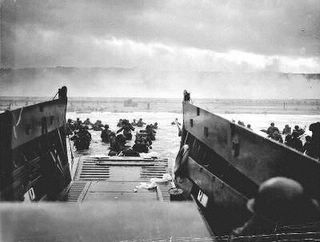June 6, 1944

An invading army had not crossed the unpredictable, dangerous English Channel since 1688 -- and once the massive force set out, there was no turning back. The 5000-vessel armada stretched as far as the eye could see, transporting over 150,000 men and nearly 30,000 vehicles across the channel to the French beaches. Six parachute regiments -- over 13,000 men -- were flown from nine British airfields in over 800 planes. More than 300 planes dropped 13,000 bombs over coastal Normandy immediately in advance of the invasion.
By nightfall on June 6, more than 9,000 Allied soldiers were dead or wounded, but more than 100,000 had made it ashore, securing French coastal villages. And within weeks, supplies were being unloaded at UTAH and OMAHA beachheads at the rate of over 20,000 tons per day.
It's been 61 years since the D-Day invasion.
On its 40th anniversary, President Reagan eloquently praised the forces of freedom that stormed the beaches of France on June 6, 1944. At Pointe de Hoc, Normandy, June 6, 1984, he delivered the following remarks. In doing so, he raised awareness, waking up the baby boom generation to the sacrifice that was made in their name, and the names of all Americans.
Thousands of men took their last breaths on those beaches, so that millions would be free to take their first.
It's appropriate to pause, in prayer and gratitude, to remember them.
Full Text
We're here to mark that day in history when the Allied peoples joined in battle to reclaim this continent to liberty. For four long years, much of Europe had been under a terrible shadow. Free nations had fallen, Jews cried out in the camps, millions cried out for liberation. Europe was enslaved, and the world prayed for its rescue. Here in Normandy the rescue began. Here the Allies stood and fought against tyranny in a giant undertaking unparalleled in human history.
We stand on a lonely, windswept point on the northern shore of France. The air is soft, but forty years ago at this moment, the air was dense with smoke and the cries of men, and the air was filled with the crack of rifle fire and the roar of cannon. At dawn, on the morning of the 6th of June 1944, 225 Rangers jumped off the British landing craft and ran to the bottom of these cliffs. Their mission was one of the most difficult and daring of the invasion: to climb these sheer and desolate cliffs and take out the enemy guns. The Allies had been told that some of the mightiest of these guns were here and they would be trained on the beaches to stop the Allied advance.
The Rangers looked up and saw the enemy soldiers -- at the edge of the cliffs shooting down at them with machine-guns and throwing grenades. And the American Rangers began to climb. They shot rope ladders over the face of these cliffs and began to pull themselves up. When one Ranger fell, another would take his place. When one rope was cut, a Ranger would grab another and begin his climb again. They climbed, shot back, and held their footing. Soon, one by one, the Rangers pulled themselves over the top, and in seizing the firm land at the top of these cliffs, they began to seize back the continent of Europe. Two hundred and twenty-five came here. After two days of fighting only ninety could still bear arms.
...These are the boys of Pointe du Hoc. These are the men who took the cliffs. These are the champions who helped free a continent. These are the heroes who helped end a war.
...Forty summers have passed since the battle that you fought here. You were young the day you took these cliffs; some of you were hardly more than boys, with the deepest joys of life before you. Yet you risked everything here. Why? Why did you do it? What impelled you to put aside the instinct for self-preservation and risk your lives to take these cliffs? What inspired all the men of the armies that met here? We look at you, and somehow we know the answer. It was faith, and belief; it was loyalty and love.
The men of Normandy had faith that what they were doing was right, faith that they fought for all humanity, faith that a just God would grant them mercy on this beachhead or on the next. It was the deep knowledge -- and pray God we have not lost it -- that there is a profound moral difference between the use of force for liberation and the use of force for conquest. You were here to liberate, not to conquer, and so you and those others did not doubt your cause. And you were right not to doubt.
You all knew that some things are worth dying for. One's country is worth dying for, and democracy is worth dying for, because it's the most deeply honorable form of government ever devised by man. All of you loved liberty. All of you were willing to fight tyranny, and you knew the people of your countries were behind you.
No comments:
Post a Comment